It's the search for truth that impels scientists, doctors, philosophers, and even writers.
Margaret Ellen Noonan was born in Brooklyn, New York to a working-class family of Irish descent. Peggy, as she was known from an early age, was one of seven children. Her father was a furniture salesman, and with so many children to raise, the family budget allowed for few luxuries. One pleasure young Peggy could afford was reading. Fiction and poetry fed her love of language and narrative, and she won praise from her teachers for her first efforts at writing verse.
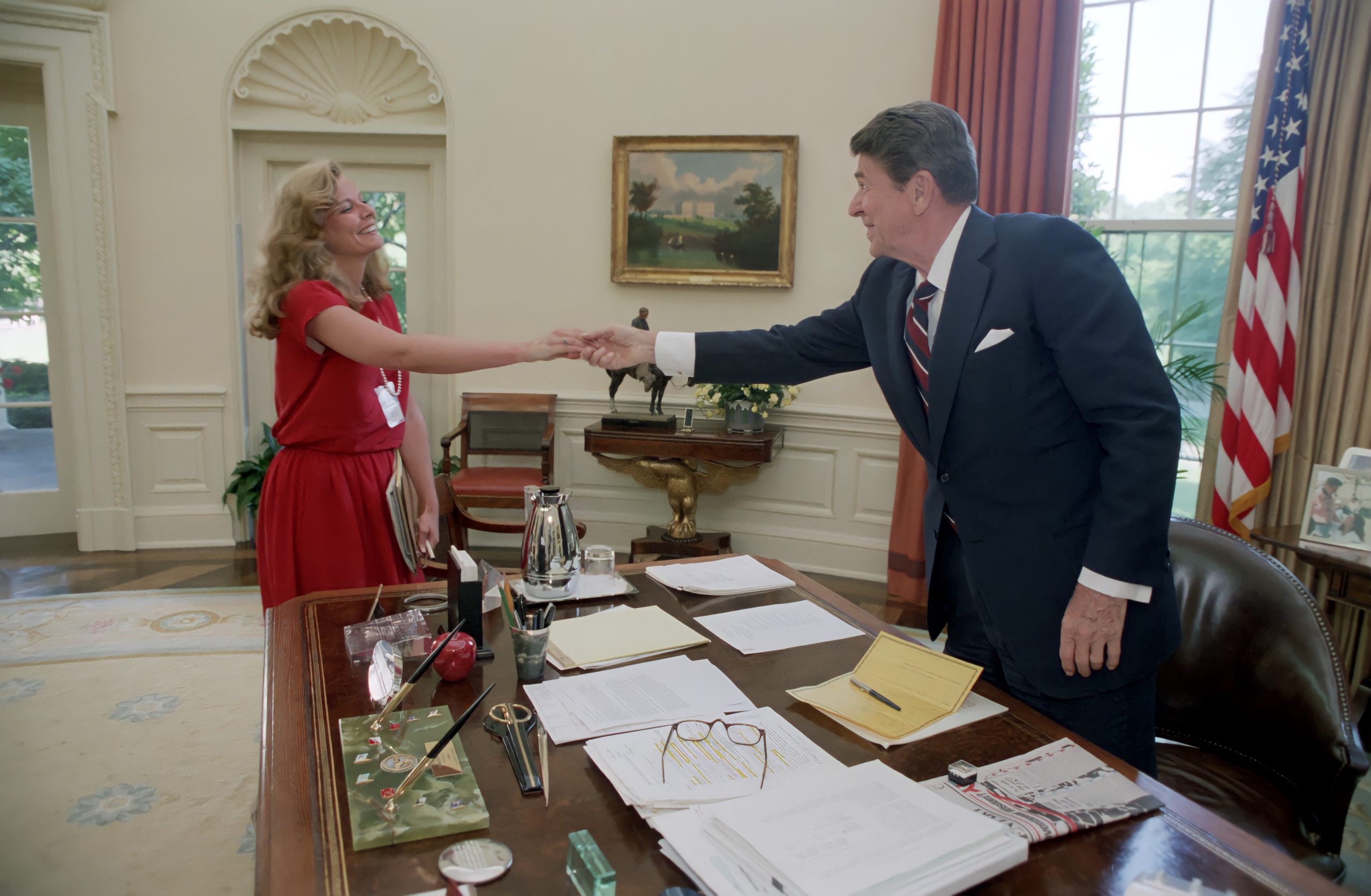
Like many Irish American families, the Noonans took special pride in the election of John F. Kennedy as President of the United States. Young Peggy followed the news closely, and sometimes stayed up late into the night reading. The Noonan family moved more than once when Peggy was growing up, first to Massapequa, Long Island, then to Rutherford, New Jersey, where she graduated from Rutherford High School. She stayed in Rutherford to work her way through Fairleigh Dickinson University, where she majored in English literature.
By the time she entered college, many of her fellow students were protesting against America’s involvement in the Vietnam War. Noonan believed that the war was an essential component of America’s struggle against communism, a commitment initiated by President Kennedy. As more and more of her contemporaries moved farther away from the values she had grown up with, she looked to more conservative thinkers and leaders for inspiration.
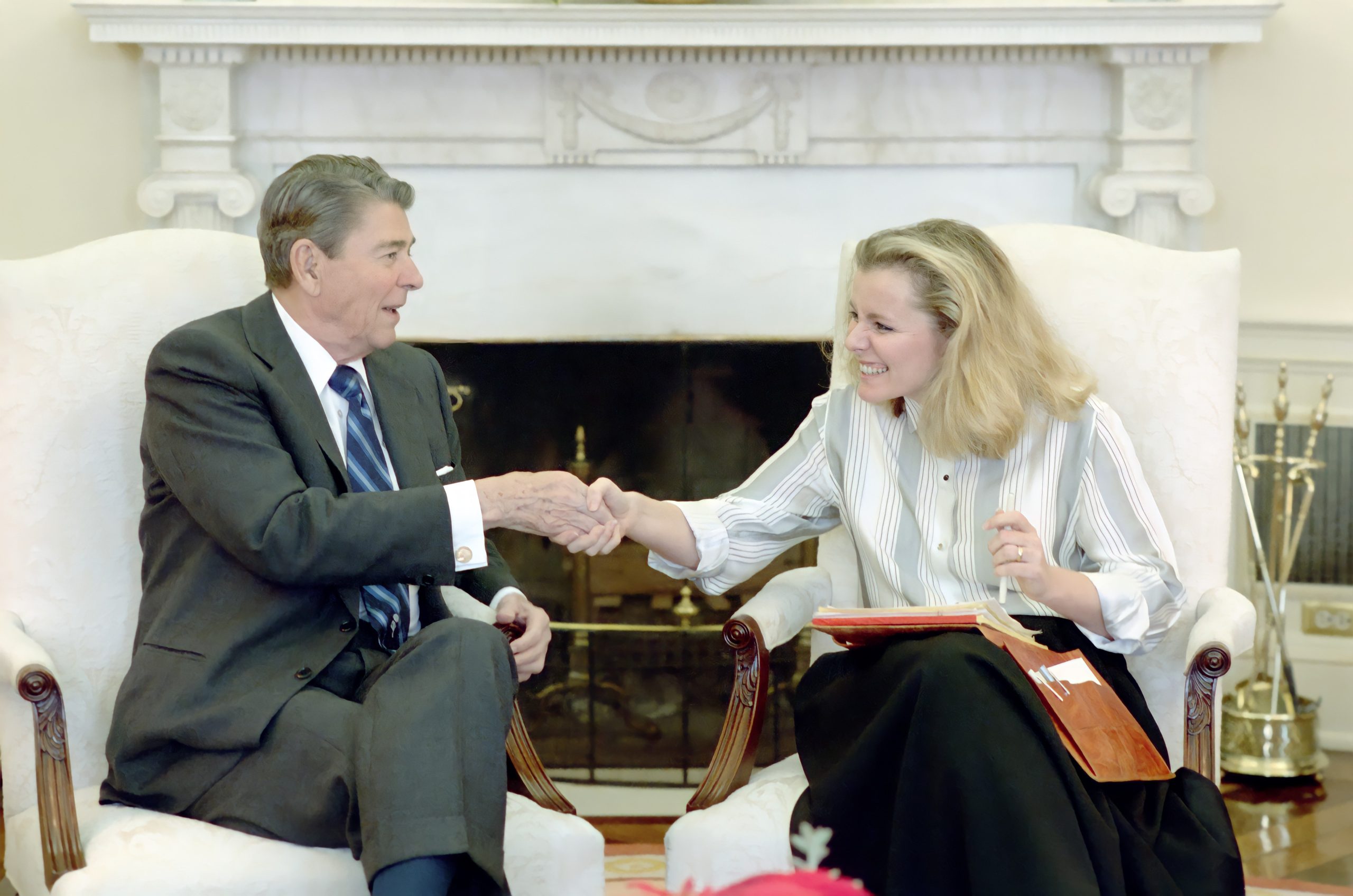
In 1975, she found work writing news on the overnight shift at WEEI Radio in Boston. She rose quickly to become the editorial and public affairs director. In 1978 and 1979 she taught as an adjunct professor of journalism at New York University. In 1981, she was hired by CBS Radio to write daily commentary for the network’s leading personality, Dan Rather. For the next three years she wrote Rather’s daily radio broadcast, and they worked well together, although their views on many issues differed. Peggy Noonan had become an enthusiastic supporter of the new president, Ronald Reagan, and wanted more than anything to work in his administration. Through an editor at the conservative journal National Review, she was introduced to the head of the White House speechwriting department, and early in 1984 she went to work in the Old Executive Office Building, next door to the White House.
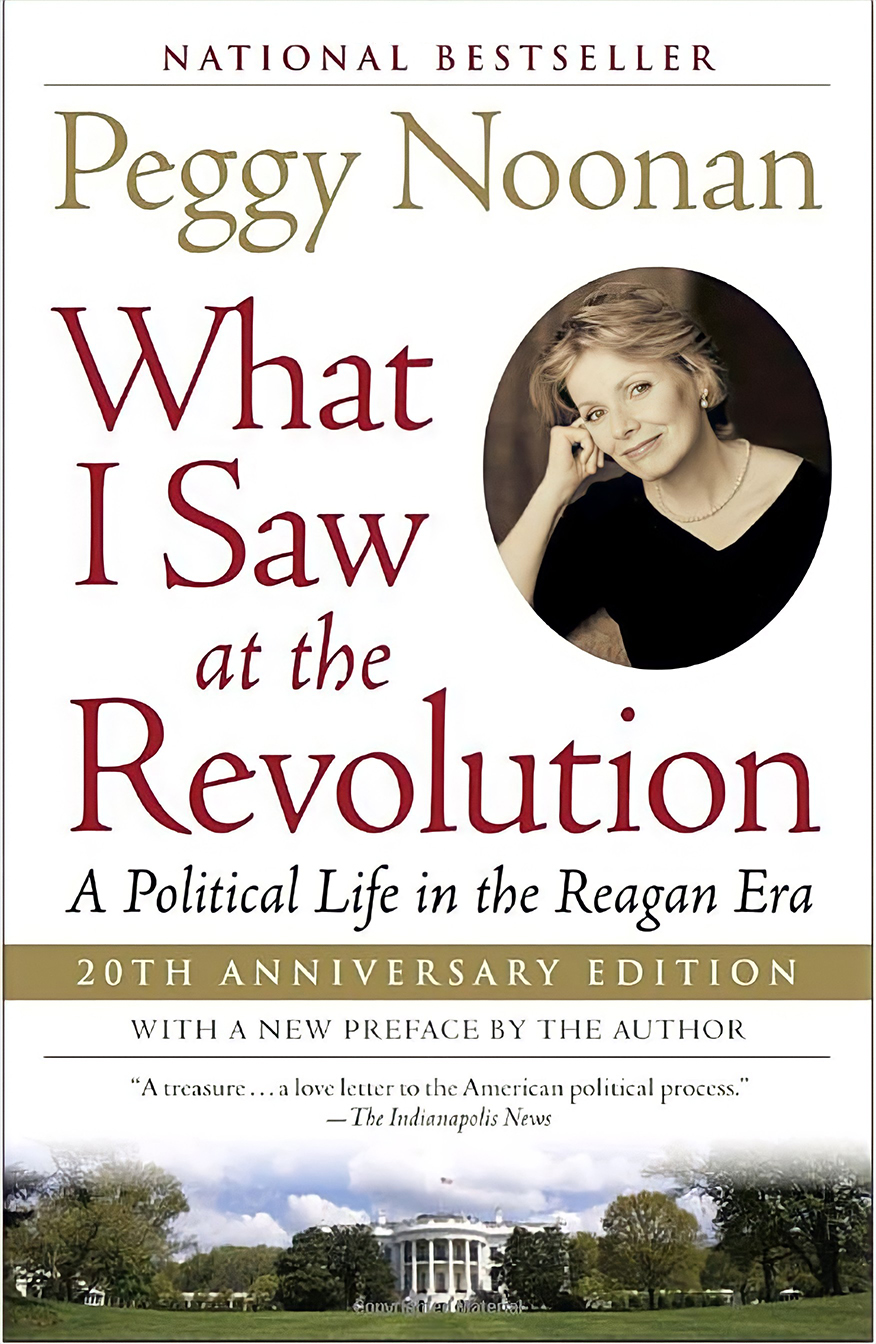
At first she was assigned to write speeches for minor occasions for both the President and First Lady, and went four months without ever meeting the President himself. The turning point came when she wrote remarks for the President to deliver at Pointe du Hoc in Normandy, on the 40th anniversary of D-Day. The remarks were so well received that after she met the President for the first time on his return from Europe, he singled her out for praise. In his second term, she was named a special assistant to the president, and he called on her to prepare some of his most important speeches. One of her most memorable assignments came when she composed the remarks the President delivered after the explosion of the Space Shuttle Challenger on January 28, 1986. He had been scheduled to deliver the annual State of the Union message to Congress that evening. Instead, he spoke to the nation from the Oval Office. The speech has been voted one of the ten best American political speeches of the 20th century. Noonan’s closing words quoted the World War II-era poem “High Flight” by John Gillespie Magee, Jr.
We will never forget them, nor the last time we saw them, this morning, as they prepared for their journey and waved goodbye and ‘”slipped the surly bonds of Earth” to “touch the face of God.”
As President Reagan’s second term came to an end, Noonan left the White House to write for the presidential campaign of Reagan’s vice president, George H.W. Bush. She was the principal writer for candidate Bush’s speech at the 1988 Republican convention. Phrases from that speech, “a kinder, gentler nation,” and “a thousand points of light,” entered the language of American politics for many years. The speech was widely credited with helping to secure Bush’s election as the 41st president that November.
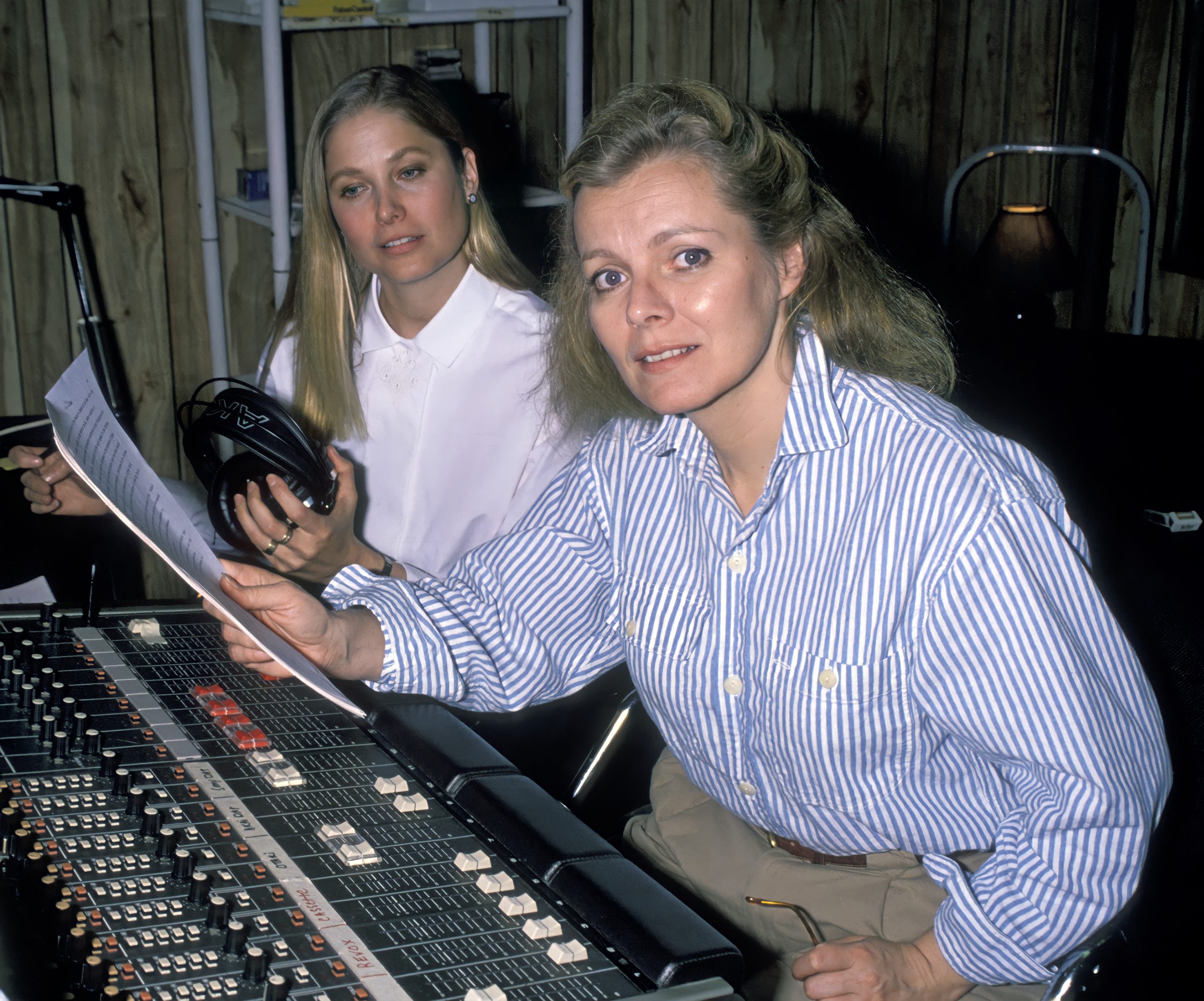
After Bush’s victory, Noonan wrote President Reagan’s farewell address to the nation. After Bush’s inauguration, she decided to leave speechwriting to embark on an independent writing career. While working in the White House, Noonan had met Richard Rahn, Chief Economist at the U.S. Chamber of Commerce. The two were married in 1985, and their son, Will, was born two years later, but in 1989 the marriage ended, and she and her son moved back to New York, where she had spent most of her life.

Noonan shared her experience of the Reagan administration in a bestselling memoir, What I Saw at the Revolution, published in 1990. She followed it in 1994 with Life, Liberty and the Pursuit of Happiness, a collection of personal reflections on motherhood, the contemporary political scene and her own search for a deeper experience of her Christian faith. In her book Simply Speaking, she shared her expertise in speechwriting and public speaking. She took a look back at the life and presidency of her former boss, President Ronald Reagan, in the biography When Character Was King. Since 2000, Noonan has written a weekly column, “Declarations,” for the Wall Street Journal. Her columns from the year following the terrorist attacks of September 11, 2001 were collected in the volume A Heart, a Cross and a Flag.
Noonan took a leave from her duties at the Wall Street Journal to participate in President George W. Bush’s re-election campaign. After the election, she returned to her writing, publishing a book on Pope John Paul II and his influence on her own spiritual journey. In 2015, she published a comprehensive collection of her columns and essays, The Time of Our Lives.
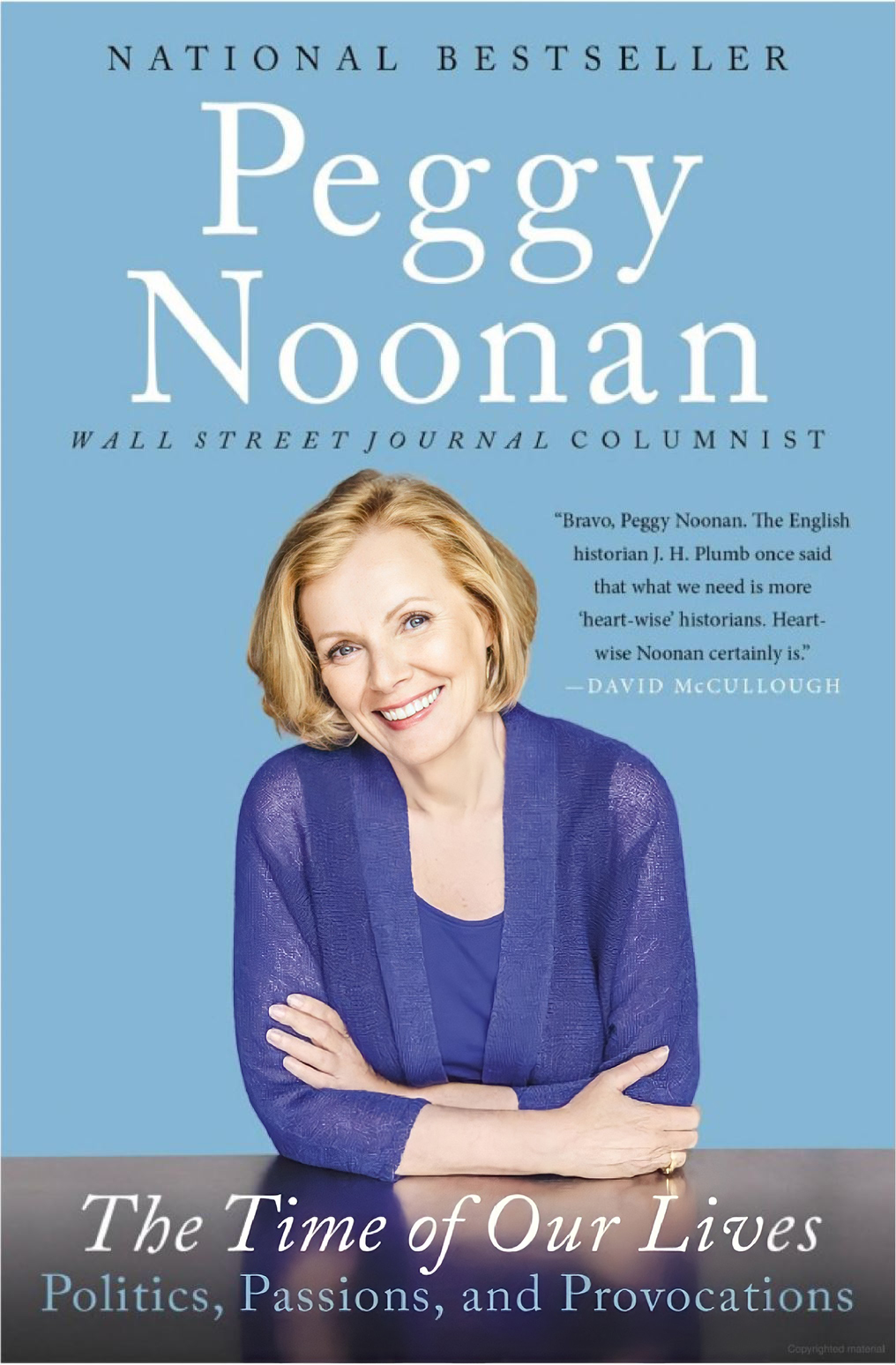
In 2017, Peggy Noonan received the Pulitzer Prize for Commentary for her coverage of the 2016 presidential campaign, particularly her insight into the populist appeal of Donald Trump and the significance of his rise to leadership of the Republican Party and election to the presidency.
In addition to her books and newspaper column, Noonan is a highly visible participant in the national conversation through her regular appearances on the Sunday morning programs, This Week and Meet the Press.

As speechwriter to Presidents Ronald Reagan and George H.W. Bush, Peggy Noonan supplied some of the most memorable phrases of a dramatic political era. A working-class girl from Brooklyn who worked her way through college waiting tables and clerking in an insurance office, she joined the Reagan White House after an early career in news radio.
Noonan crafted President Reagan’s inspiring remarks on the 40th anniversary of D-Day, and his moving address after the loss of the Space Shuttle Challenger, frequently cited as one of the best American political speeches of the 20th century. At the 1988 Republican convention, George H.W. Bush accepted his party’s nomination, and perhaps secured his election as president, with a breakthrough speech, drafted by Noonan, calling for a “kinder gentler nation,” and saluting America’s community volunteer organizations as “a thousand points of light.”
Since leaving the White House, Peggy Noonan has become a bestselling author, an influential newspaper columnist, and a leading light of the Sunday morning talk shows. Her books, including What I Saw at the Revolution, When Character Was King and The Time of Our Lives, have topped the nonfiction bestseller lists, and no political season is complete without her wise and witty input. In her books, her weekly column in The Wall Street Journal, and her regular television appearances, Peggy Noonan sounds a clear consistent note, affirming her belief in the enduring virtues of faith and patriotism, and the paramount importance of character in political leadership.
What was the most exciting moment in your career so far?
Peggy Noonan: Getting hired to work in the White House of Ronald Reagan was probably the most exciting day of my life, when I knew I was going to be hired there. I mean, I was a young woman, and I had a sense of what I still think of, and oddly enough, as appropriate awe, towards the White House and what happens there and who works there. That I was extremely lucky to be one of a few thousand Americans in U.S. history who actually worked in the White House. I adored Ronald Reagan. And I was going to — two wonderful things were going to happen for me. One, I was going to work in the White House for a president. The other was the president was Reagan and I adored him. So I’ve had many exciting moments in my life. I mean, when my first book went on the New York Times bestseller list was nice, but nothing compares to finding out I was going to work for the White House — work in the White House for Ronald Reagan.
You mentioned the word “awe” and “appropriate awe,” yet you of all people have been such an insider, actually putting words in presidents’ mouths. Were you able to keep that sense of awe and veneration for this office and what it means?
Peggy Noonan: Yeah, I have a very split view about the political figures in power in Washington. One is that I’m always impressed when I’m talking to the Majority Leader of the U.S. Senate, or the Vice President of the United States, the Speaker of the House, or the President of the United States. These are marvelous jobs and they are often — not always — but often held by men trying very hard to do them well. And I have a certain — I will never stop being impressed by the White House itself to this day. I mean, I’ve been in the Clinton White House three or four times. I can’t stop being impressed just by the play of light on the walls, and by the art, and by the very air of the place, quite literally, the smell of the flowers in there, and the way things sound with the high ceilings and everything. So I still have this awe, and yet at the same time I have a sharper sense than ever that they are just people in there. They are people who get headaches and who do stupid things and sometimes unethical things and sometimes venal things. So I don’t know if that’s a balanced view or a schizophrenic view. You know, it’s one or the other. It’s probably schizophrenic!
What does the American Dream mean to you?
Peggy Noonan: The American Dream to me means anyone can come from anywhere and rise to any position in the United States of America. And the other part — it’s not quite the American Dream, but it’s something I think of more and more of these days when I think about America. One of the Founding Fathers, and I don’t remember who, said, “America will be great as long as she is good.” And of course, implicitly, she will no longer be great when she is no longer good. And I wonder always, “Are we still good?” i.e. are we still great? I wonder because we’ve all seen our country change in the past 30 years. I don’t know if we’re still — quote — good — unquote.
What would make us better?
Peggy Noonan: More honesty, less cant. I think I’m pronouncing the word correctly: C-A-N-T, no apostrophe. A marvelous old English word meaning drivel, garbage, disingenuous bull, you know. More honesty, less cant. Beating back our government would help us a bit, I think. I think the government is too big, too powerful, takes too much from us, pushes us around too much. And as a people, I keep wondering if — you know, I was born in 1950 and still, in the middle of this century, people born when I was still just imbibed a sense — partly through school, partly through books, partly through modern entertainment, through movies, through TV — that it was a good thing to be American, and why it was a good thing, and what America was about, what the Constitution was about, what our history was about. I just keep wondering if we communicate that so well to our kids. And if we don’t communicate that so well to our kids, then they’re not growing up with the same love for America, or reasons to love America, that we grew up with. Well, what are the implications of that? If they don’t love and honor this thing, they won’t try to protect this thing. And what if they don’t try to protect this thing? Then we could lose this thing.
And here we are in the area where our institutions of self- government first took shape.
Peggy Noonan: Yeah, in Williamsburg. Tom Clancy pointed that out last night. It happened here, between Jamestown, Williamsburg and Yorktown. So here we are in the very cradle. But I worry about America these days. I don’t mean it’s weak. It’s not. And I don’t mean it’s bad. It’s not. But I worry about her in a way that I didn’t used to, say 25 years ago. And that’s not just because I’m older and worry more.
